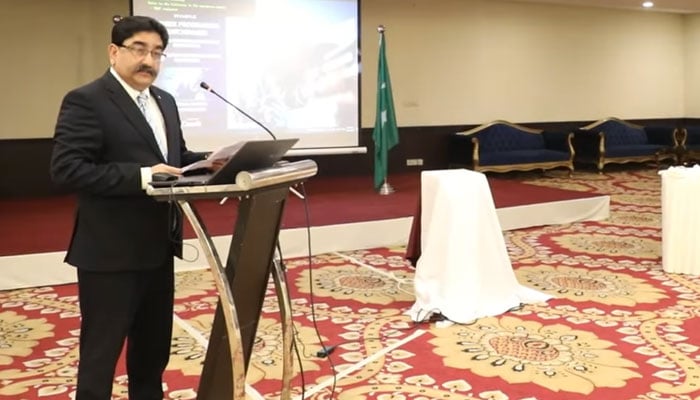Project Watchmaker to enhance capacity to counter terror threats
Participants receive advanced training on Interpol’s specialized databases
ISLAMABAD: Interpol’s Project Watchmaker is designed to enhance national capacity to counter threats from bomb-making and chemical attacks through an exchange of intelligence and operational strategies.
This was highlighted during Interpol’s inaugural Working Group Meeting for Project Watchmaker from October 29-31, 2024, in Islamabad. It gathered top officers from Pakistan’s provincial police forces, Counter-Terrorism Departments (CTD), the National Counter Terrorism Authority (NACTA), and the National Forensic Agency, marking a coordinated effort to address the escalating threat of chemical and explosive attacks.
The meeting opened with remarks from Alan Grimmer, Unit Coordinator of Interpol’s CBRNE/CMX, who stressed the importance of international cooperation in combating evolving security threats. He emphasized that Project Watchmaker, led by Interpol, is designed to enhance national capacity to counter threats from bomb-making and chemical attacks by facilitating the exchange of intelligence and operational strategies among participating nations.
Throughout the session, the participants received advanced training on Interpol’s specialized databases, as well as data management and search tools specifically developed to track and analyze cases involving chemicals, explosives, and bomb-making materials. Interpol’s data exchange systems were also introduced, enabling participants to manage chemical and explosive case data more effectively. Key speakers included Interpol Specialized Officer Lasha Giorgidze and Criminal Intelligence Analyst Scott Watson, who provided insight into the latest technological tools and investigative techniques for thwarting terrorist threats.
Director General of the Federal Investigation Agency (FIA), Ahmad Ishaque Jehangir underscored the need for collaboration and advanced technology to combat non-state actors exploiting chemical and explosive vulnerabilities. “Terrorist groups are rapidly advancing their capabilities to manufacture and deploy dangerous weapons, making Project Watchmaker an essential tool in Pakistan’s efforts to thwart these evolving threats,” Jehangir stated.
He further emphasized the critical role of NCB-Interpol Islamabad in providing timely intelligence and investigative support to local law enforcement agencies. Jehangir praised the contributions of provincial police forces, NACTA, and the National Forensic Science Agency, with special recognition extended to the FIA’s Counter-Terrorism Wing (CTW) for their expertise in handling complex terrorism cases.
The event concluded with a certificate ceremony, where DG FIA distributed certificates to participants for their contributions. A ceremonial exchange of souvenirs followed, symbolizing a strengthened commitment among law enforcement agencies to cooperate in safeguarding public security against chemical and explosive threats.
-
 Prince William Fears Andrew Scandal Could Cast Shadow Over His Future Reign
Prince William Fears Andrew Scandal Could Cast Shadow Over His Future Reign -
 Snoop Dogg Jumps Into David Beckham, Brooklyn Family Feud With Strong Message: ‘No Father Is Perfect’
Snoop Dogg Jumps Into David Beckham, Brooklyn Family Feud With Strong Message: ‘No Father Is Perfect’ -
 'Monarchy Seems Quite Unstable Now', King Charles Warned
'Monarchy Seems Quite Unstable Now', King Charles Warned -
 UK To Bring Netflix, Disney & Amazon Prime Video Under New Broadcasting Rules
UK To Bring Netflix, Disney & Amazon Prime Video Under New Broadcasting Rules -
 Prince William Reacts As Earthshot Prize Dragged Into Epstein Controversy
Prince William Reacts As Earthshot Prize Dragged Into Epstein Controversy -
 Tropical Cyclone Horacio Becomes World’s First Category 5 Superstorm Of 2026: Latest Forecast & Risks Explained
Tropical Cyclone Horacio Becomes World’s First Category 5 Superstorm Of 2026: Latest Forecast & Risks Explained -
 Hilary Duff Recalls Brutal Thing She Did To Husband Matthew Koma After Losing Their Home In Los Angeles Wildfire
Hilary Duff Recalls Brutal Thing She Did To Husband Matthew Koma After Losing Their Home In Los Angeles Wildfire -
 Princess Beatrice, Edo Mapelli Mozzi Fall Into Marital Woes: ‘He Doesn’t Want Her Seen With Andrew’
Princess Beatrice, Edo Mapelli Mozzi Fall Into Marital Woes: ‘He Doesn’t Want Her Seen With Andrew’ -
 Meta’s Internal Memo Reveals How Executives Ignore Safety Warnings To Push Messenger Encryption Rollout Despite Risks To Teen Safety
Meta’s Internal Memo Reveals How Executives Ignore Safety Warnings To Push Messenger Encryption Rollout Despite Risks To Teen Safety -
 Robert Carradine's Shocking Suicide Answer 'lies' In Brother David Old Tragic Incident
Robert Carradine's Shocking Suicide Answer 'lies' In Brother David Old Tragic Incident -
 'CIA' Star Tom Ellis Drops Bombshell Reason Why He Stayed Away From 'FBI': I Know What They Do'
'CIA' Star Tom Ellis Drops Bombshell Reason Why He Stayed Away From 'FBI': I Know What They Do' -
 Biographer Calls Andrew National Security Risk: ‘This Huge Can Of Worms Is Getting Closer To King’
Biographer Calls Andrew National Security Risk: ‘This Huge Can Of Worms Is Getting Closer To King’ -
 DeepSeek Under Fire: Anthropic Accuses Chinese AI Firm Of Misusing Claude For Unauthorized Model Training
DeepSeek Under Fire: Anthropic Accuses Chinese AI Firm Of Misusing Claude For Unauthorized Model Training -
 Would You Drive In A Driverless Taxi? AI-powered Robotaxis Roll Out In London Amid Growing Debates Over Road Safety, Passenger Convenience
Would You Drive In A Driverless Taxi? AI-powered Robotaxis Roll Out In London Amid Growing Debates Over Road Safety, Passenger Convenience -
 Trump’s Tariff Plan: 10 Percent Rate Takes Effect Despite 15 Percent Announcement Following Supreme Court Ruling
Trump’s Tariff Plan: 10 Percent Rate Takes Effect Despite 15 Percent Announcement Following Supreme Court Ruling -
 Eric Church Reveals How Vince Gill Made His Brother Barndon's Death 'a New Normal'
Eric Church Reveals How Vince Gill Made His Brother Barndon's Death 'a New Normal'




